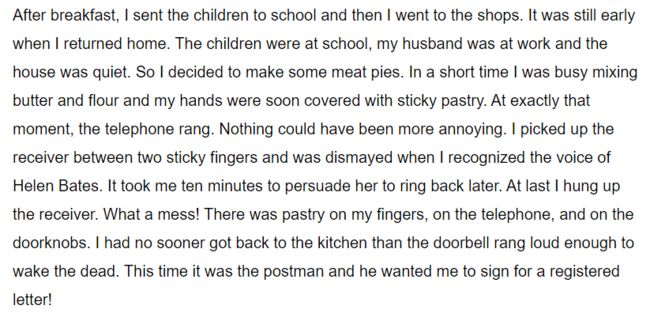- Android编译系统——Kati执行过程(十一)
c小旭
android系统编译
在Android构建系统中,SoongUI是Soong构建框架的入口点。通过前面的学习我们知道,在执行make兼容模式编译时,soong_ui会调用ckati来将传统的Android.mk和其他Makefile文件转换为Ninja构建文件(如build-aosp_arm.ninja和build-aosp_arm-package.ninja)。这些.ninja文件随后会被ninja工具调用以进行真正
- 工作上持续的焦虑,让我今天的情绪崩溃了!
恍恍惚惚度流年
1.今天我情绪崩溃了!2.我也说不清是焦虑还是烦躁或是别的什么情绪,总归是不好的情绪!3.从昨天的心神不宁到昨晚的情绪低落,我一步步步入情绪的陷阱!4.昨天工作到晚上8点多,今天8点多又起来工作到12点,真心累!5.12点开始做饭,四个菜,米饭做的少了,感觉大家不够吃。6.饭做好后,喊了我老公两遍让他吃饭,都没喊过来~说是嫌饭太烫了!7.吃饭的时候,我老公又觉得一个菜做咸了,其他的做淡了!8.我自
- 学生报到
平凡之梅
平凡•原创01代班主任生活之抓阄上午十一点抓阄,我让宁宁替抓,B班。我自己手气很少可以抓到好的。其实,也无所谓优劣。B班有个尖子生,全年级第二名而已。会后,通知几位亲戚朋友他们的孩子在几班。02签到报到的时候,熟悉的面孔有几个,但我们班的前几名一个也没有分过来。倒是不学习的,我在网上看到别人写的,就改动许多,发给我们班级,其他班主任也参考。尊敬的各位家长:新学期马上就要开始了,相信大家都对新学期充
- 转发【同频共振】
木子阿娟
有人为了合群,总是逼自己参与到其他人的聊天中,连笑都要把握时机和节奏。有人曾为了融入一个圈子,努力模仿别人的穿着打扮、言行举止,最后把自己弄得既不像别人,也不像自己;还有人为了不被孤立,一直强迫自己参加一些并不喜欢的饭局,还假装很开心的样子。现实生活里,很多人都是如此,费尽心思讨好别人,委屈求全。但是,一味地讨好和迎合,换不来对应的尊重。人与人之间相处,比合群更重要的,是先找到能够同频共振的人。愚
- 2021-10-03
老马阿飞大哥
洛邑古玩城的“小石林”------记洛阳小石林李德纯先生弟子作品洛邑古玩城是洛阳新兴起的一支文玩奇葩,也是全国古玩艺术民间高手云集的地方!更是洛阳历史文化沉淀展示的一种场合。也许业外人士不晓得,但大家对于奇石感觉都是一样的感觉,就是稀奇难得!2021年10月2日,也是国庆节的第二天,我在洛邑古玩城看到了一位年龄不算大,但文质彬彬的一位朋友----杨文军先生及刘灿力朋友,他们没有过余的寒暄与其他,我
- el-amap-bezier-curve运用及线弧度设置
·零落·
Vue日常研发问题总结vue.jsjavascriptecmascript
文章目录简介示例线弧度属性主要弧度相关属性其他相关样式属性完整示例链接简介el-amap-bezier-curve是Vue-Amap组件库中的一个组件,用于在高德地图上绘制贝塞尔曲线。基本用法属性path定义曲线的路径,可以是多个弧线段的组合。stroke-weight线条的宽度。stroke-color线条的颜色。stroke-style线条的样式。stroke-opacity线条的透明度。
- Day262-不改父之臣政/哀矜勿喜/恶居下流
君子重威
19.18:曾子曰:“吾闻诸夫子:孟庄子之孝也,其他可能也;其不改父之臣与父之政,是难能也。”译文:曾子说:“我听夫子说过:孟庄子的孝道,其他人可以做到;但他不改变父亲的臣子和父亲的政策是别人很难做到的。”19.19:孟氏使阳肤为士师,问于曾子。曾子曰:“上失其道,民散久矣。如得其情,则哀矜而勿喜。”译文:孟氏让阳肤去做典狱长,阳肤问曾子需要注意的事。曾子说:“上层执政者失去道义、民心涣散很久了。
- 渗透攻击红队百科全书
绝不原创的飞龙
渗透
据说原始扫描件有病毒,我就解析Xref提取图片然后重新生成了一份。我也拿不到纸质书,根据网上流传的版本加工了一下,不清楚是肯定的。其他的不说了,懂的都懂。目录第一章信息搜集1.1主机发现1.2关联信息生成1.3开放漏洞情报1.4开源情报信息搜集(OSINT)1.5GithubHacking1.6GoogleHacking1.7Gitlcret1.8Mailsniper.psl获取Outlook所有
- 成功日记469天:加油
微小确幸
1.下班陪宝玩,一起做运动2.和女儿一起画画,睡前悄悄话3.梳理家族中医事宜,感谢璋导的指点4.【积微会】百日筑基活动开启Day4,分享一个有效的瘦腰技巧5.公众号【微小确幸】更新第267篇原创文章,同步其他平台。6.感谢老公送我和娃上学上班7.感谢同事的指导顺利切分了指标不用加班8.一切都是最好的安排,感谢遇见,感恩同行9.练习生命基本功
- 想象篇盗墓笔记
zy呵呵呵
(2)克凌来到穿越门面前,穿越门对克凌说:“这位男士,请问你想去哪儿?”“我要到一百年以前,去盗墓!”“呵呵,去盗墓啊!提醒你,那里非常危险哦!”“没事,我不怕!”“好的,现在开始穿越之旅,坐稳点!”一眨眼,就来到1918年,克凌看了看周围,自己在街上,非常吵闹。克凌来到一家饭店,要了盘瓜子,在吃起来,听着其他人谈话。“听说要来个人,要开拍卖会。”“真的吗?”“听说那是个财主!”“那东西是恶龙的蛋
- UniApp TabBar 用户头像方案:绕过原生限制的实践
金翅
uni-app
需求场景:在UniApp项目中,需要将TabBar首页项(index)的图标替换为当前用户的网络图片,并实现:放大且圆形显示。点击该图标时,页面滚动回顶部。切换到其他分类时,首页Tab项恢复为普通首页图标。尝试方案与问题:自定义TabBar:○可实现功能:网络图片、样式定制、点击事件。○致命缺点:页面切换时TabBar闪烁,页面重新加载,体验极差。❌放弃原生TabBar:○优点:切换流畅无闪烁,体
- Uniapp之键盘弹窗
适用范围评论输入框自定义键盘顶部工具栏其他吸附于键盘顶部的弹框意义对于输入框来说,一般都包含自动抬高输入框,但是对于一些自定义窗口来说(比如输入框下添加工具栏、键盘顶部添加工具栏等),就需要自己处理弹框位置了,那么这个时候键盘弹窗就解决了复杂的处理。示例下面示例用于展示keyboard-popup使用示例,当textarea聚焦时,textarea就会自动抬高到键盘上方。exportdefault
- [Java实战]Spring Boot 3实战:使用QQ邮箱发送精美HTML邮件(四十三)
曼岛_
Java实战javaspringboot邮件
[Java实战]SpringBoot3实战:使用QQ邮箱发送精美HTML邮件(四十三)本文将详细介绍如何在SpringBoot3中配置QQ邮箱发送专业的HTML格式邮件,解决实际开发中的邮件发送问题。一、结果验证1.1接口调用1.2邮箱查收二、QQ邮箱配置关键点2.1QQ邮箱特殊配置要求QQ邮箱与其他邮箱服务不同,需要特别注意:必须使用授权码而非登录密码需要启用SSL加密连接端口使用465(SSL
- 35副房树人
知心妈妈春平
画作主题:世外桃园画者基本信息:性别:女年龄:34职业:家庭主妇家庭情况:老公,儿子,女儿其他背景信息:画者困惑:不知道怎么样才能教好孩子整体印象1、印象关键词:2、绘画时间:40分钟(时间过长,画者纠结,犹豫,追求完美,慢性子)3、绘画顺序:房子,小溪,树,太阳,人4、涂抹和擦拭:一、总:全局着眼1、画面大小:充满画面,画者心理能量充足、自信,可能自我中心、自负,不排除具有攻击性、情绪化、躁动2
- 灼口综合症的主要症状有什么呢?
小笼包556
口舌疼痛:本病以口舌灼痛为主要表现。①常呈烧灼感样疼痛,或呈辣痛感、刺痛感、钝痛感;往往为持续性、表在性、自发性疼痛,或轻或重,时轻时重,多数患者表现为上午轻,下午重,过多说话、食干燥性食物、空闲休息时、疲劳、紧张、情志不畅时疼痛加重。②疼痛部位以舌为主,多位于舌的某一部位,如舌尖、舌缘、舌根、舌背,并多为游感性,自感痛点部但又摸不到疼痛的准确部位。③疼痛部位亦可位于口腔其他部位,如硬腭前部、下唇
- 机器人-组成结构-感知 - 决策 - 执行
具身智能-查布嘎
具身智能机器人人工智能
目录一、感知系统内部传感器:外部传感器:二、智能决策系统机器学习家族1.1机器学习2.1深度学习2.2深度学习模型(主要属于监督/强化学习范畴,但结构通用):3.1监督学习3.2监督学习模型4.1半监督学习4.2无/半监督学习模型:5.1无监督学习5.2生成模型(可属于监督/无监督):6.1强化学习7.1其他学习三、控制系统(运控)①对应小脑和脊柱一、感知系统①对应人体的五官。由具有不同功能的各种
- 那些年追过的1988
etme
今天在追《runningman》的时候,里面想起了1988的歌曲,瞬间脑袋里呈现了电视剧里面的镜头,第二刷1988,也是在前不久。1988,主要是讲的友谊,里面顺带也延伸出了很多其他方面的东西,亲情,爱情。住在韩国首尔双门洞巷子里的几家人,代表着现在社会上的不同层次,也把我们那时候,小伙伴的身份完美的体现了出来。德善~一个大大咧咧的孩子,一个倒霉孩子。家里的地位,让人觉得可怜,姐姐的欺负,父母对她
- 荆州正规亲子鉴定中心名单共11家(附2024最新更新鉴定收费一览)
鼎律基因刘主任
医院不做亲子鉴定的原因比较多,但是归纳起来一般有以下几个原因:一是亲子鉴定属于小众市场,但是实验室的投资有比较昂贵,所以现在的模式一般都是在某地投资建立实验室,然后其他地区采集到的样本统一送到该实验室进行鉴定;二是医院的主要任务还是以救死扶伤治病救人为主的,并没有过多的精力去做其他的事情,光这一项就够他们忙的了;三是亲子鉴定属于司法系统尤其是上户口的司法鉴定,而医院是属于医疗系统的。亲子鉴定在哪里
- 机器学习入门(五):线性回归—从模型函数到目标函数
米饭超人
从数据反推公式假设我们获得了这样一张表格,上面列举了美国纽约若干程序员职位的年薪:enterimagedescriptionhere大家可以看到,表格中列举了职位、经验、技能、国家和城市几项特征。除了经验一项,其他都是一样的。不同的经验(工作年限),薪水不同。而且看起来,工作年头越多,工资也就越高。那么我们把Experience与Salary抽取出来,用x和y来分别指代它们。enterimaged
- AWS Certified Cloud Practitioner 认证考试总结
DEMI0815
AWSaws云计算
AWSCloudTrailLogs对您的AWS账户进行监管、合规性、操作审计和风险审计。AWSCloudTrail可用于记录您的AWS账户的AWSAPI调用和其他活动,并将记录的信息保存到您选择的AmazonSimpleStorageService(AmazonS3)存储桶中的日志文件中。默认情况下,CloudTrail传输到S3存储桶的日志文件使用具有AmazonS3托管密钥的服务器端加密(SS
- Python中的模块和作用域
全新的饭
模块的定义模块是写有python源代码的文件(其中定义了一组函数和其他对象)或c、c++编译的对象文件模块名称就是文件名模块存在的意义(使用模块的好处)可通过使用模块避免名称冲突(两个模块中可定义相同名称的函数)模块使python代码更易于管理(标准python函数位于特殊模块而非语言核心中,因此用户可根据需要加载目标模块)添加自己的模块将自己的模块添加到sys中使之可以通过使用import导入(
- 环岛骑行5
我相信光的存在例如你
整晚都在祈祷这雨第二天就停下,结果这雷声雨声一直没停过,两点、三点、四点,已经六点多了还是哗啦啦的大雨,看着窗外的这狂风暴雨,一时间有些犹豫。昨天的防雨罩简直就是个玩笑,两个书包都淋透了,除了被塑料袋装着的两套衣服,其他都湿透了。把衣服到处挂,空调制热开一整晚,但愿明天都能干的那种。最后一看时间快七点了,可不能一直等下去吧,走还是不走?摸了一下衣服,干得差不多了,拿了个大塑料袋把衣服装好,退了房,
- 健康的意愿(沙龙4期)
孺子心画
刚才我们在交流分享的时候,有位老师提到说,心流这种活动好是好,但是没什么用。因为很多人根本就不愿意尝试着进入心流,比如说看书好,但人更容易去选择看电视剧,或者是去看小视频,因此你对他讲什么心流,是没有意义的。关于这个问题,我想解释一下。对心流的研究,我觉得至少有两个对我们来说比较有帮助的部分。一个是我们要知道,尽管读书一类的心流活动相比其他非心流活动,似乎比较不容易被选择,但心流体验带来的主观幸福
- 23种设计模式--#2单例模式
一、简介1.什么是单例模式单例模式是设计模式中创建型模式的一种,它的核心思想是保证一个类在整个应用程序的生命周期中,只存在一个实例对象,并且这个实例对象能够被系统中的其他组件统一访问。就像现实生活中一个国家只有一个首都,一个公司只有一个CEO一样,在软件系统中,某些类的对象也只需要存在一个,以避免重复创建对象造成的资源浪费,或是多个实例同时存在导致的状态不一致等问题。单例模式看似简单,却是实际开发
- 2018.12.14学仿诗
陳境墨
2018年12月14日晚星期五阴【亲子读经】《易经》《唐诗》《诗经》《新概念英语》【养生】159换食第三天(今天中午和晚上加青菜)【学习】华老师的历史早课,听完后之前对吕后的那种感觉可恶的心理没有了,以前觉得她也是很专横的女人,现在有了更多的同情。女人很多时候都是被逼出来的。【生活随记】今天又是简简单单的一天。早上问浚铠晚上要吃什么?他说随便,我说那就鱿鱼吧,他说有鱿鱼就可以了,不用其他菜。汤呢?
- 广州孩子上户口做亲子鉴定怎么办孩子上户口做亲子鉴定5家正规机构推荐
亲子DNA鉴定咨询中心
按照正常情况,孩子上户口是不需要做亲子鉴定的。但是有特殊情况:孩子上户口需要做亲子鉴定的情况有这些:第一,非婚生子女,这种情况比较多;第二,未办理《出生医学证明》的无户口人员;第三,不符合计划生育政策的无户口人员;第四,因拐卖遗失后寻回人员;第五,弃儿迁回落户;第六,被领养人员落户;第七,其他情况等;上户口做亲子鉴定是我国相关法律条文的要求,可以保证户口信息的准确性,保护未成年人的权益,对于维护社
- 【C#】Vscode中C#工程如何引用自编写的dll
如题问了几个AI,最后实验出来这个说的对,实际效果也是可以的,修改完csproj,关闭文件夹重新打开工程即可在VisualStudioCode中使用C#项目添加自定义DLL动态链接库的步骤如下:通过修改.csproj文件将DLL文件放入项目目录在项目根目录创建lib文件夹(或其他名称)将你的YourLibrary.dll放入此文件夹编辑项目文件(.csproj)打开项目文件(如YourProjec
- 低速信号设计之 PECI 篇
万花丛中一抹绿
网络服务器服务器硬件研发低速信号设计PECI
一、PECI原理介绍PECI,即PlatformEnvironmentControlInterface(平台环境控制接口),由Intel提出,是一种用于处理器与其他芯片或系统稳定性监控设备之间通信的专用单线型双向总线。从物理连接上看,它采用单线连接方式,极大地简化了硬件设计,减少了布线复杂度和引脚数量。在电气特性方面,主从机接口内均采用强上拉方式,主机还配备弱下拉,使得总线在默认状态下为0伏。信号
- 高速设计注意事项总结——LVDS篇
万花丛中一抹绿
服务器高速信号设计服务器硬件研发高速信号设计LVDS
LVDS(低压差分信号)作为一种低压差分传输技术,以其独特的性能在高速数据传输领域占据重要地位。在高速设计中,需明确其技术特性与设计要点,并通过与其他高速接口的对比,精准把握设计核心。一、LVDS高速设计核心注意事项(一)信号完整性保障LVDS以差分信号传输为核心,其差分对阻抗需严格控制在100Ω±10%,通过微带线或带状线结构实现。布线时必须保证差分对等长(误差<5mil)、等距(间距为线宽3-
- 欢乐的周末
糊里糊涂吹毛求疵
8月份最最最最最悠闲的一个周末,不要太舒服。哈哈哈~整个8月份都在繁忙的工作和各种突然情况中度过。新的工作第二个月,重新回到原来的团队,原来的领导,不同的合作伙伴,虽然很多和来之前想象的不同,很多和来之前谈的不一样,有很多感慨和不知所错,能做的只有不断的做好自己的工作,其他的等待结果说话。幸好在月底有一个这样的休息让我回血满满!!!9月期待新的开始,新的成就~冲鸭~~~
- 项目中 枚举与注解的结合使用
飞翔的马甲
javaenumannotation
前言:版本兼容,一直是迭代开发头疼的事,最近新版本加上了支持新题型,如果新创建一份问卷包含了新题型,那旧版本客户端就不支持,如果新创建的问卷不包含新题型,那么新旧客户端都支持。这里面我们通过给问卷类型枚举增加自定义注解的方式完成。顺便巩固下枚举与注解。
一、枚举
1.在创建枚举类的时候,该类已继承java.lang.Enum类,所以自定义枚举类无法继承别的类,但可以实现接口。
- 【Scala十七】Scala核心十一:下划线_的用法
bit1129
scala
下划线_在Scala中广泛应用,_的基本含义是作为占位符使用。_在使用时是出问题非常多的地方,本文将不断完善_的使用场景以及所表达的含义
1. 在高阶函数中使用
scala> val list = List(-3,8,7,9)
list: List[Int] = List(-3, 8, 7, 9)
scala> list.filter(_ > 7)
r
- web缓存基础:术语、http报头和缓存策略
dalan_123
Web
对于很多人来说,去访问某一个站点,若是该站点能够提供智能化的内容缓存来提高用户体验,那么最终该站点的访问者将络绎不绝。缓存或者对之前的请求临时存储,是http协议实现中最核心的内容分发策略之一。分发路径中的组件均可以缓存内容来加速后续的请求,这是受控于对该内容所声明的缓存策略。接下来将讨web内容缓存策略的基本概念,具体包括如如何选择缓存策略以保证互联网范围内的缓存能够正确处理的您的内容,并谈论下
- crontab 问题
周凡杨
linuxcrontabunix
一: 0481-079 Reached a symbol that is not expected.
背景:
*/5 * * * * /usr/IBMIHS/rsync.sh
- 让tomcat支持2级域名共享session
g21121
session
tomcat默认情况下是不支持2级域名共享session的,所有有些情况下登陆后从主域名跳转到子域名会发生链接session不相同的情况,但是只需修改几处配置就可以了。
打开tomcat下conf下context.xml文件
找到Context标签,修改为如下内容
如果你的域名是www.test.com
<Context sessionCookiePath="/path&q
- web报表工具FineReport常用函数的用法总结(数学和三角函数)
老A不折腾
Webfinereport总结
ABS
ABS(number):返回指定数字的绝对值。绝对值是指没有正负符号的数值。
Number:需要求出绝对值的任意实数。
示例:
ABS(-1.5)等于1.5。
ABS(0)等于0。
ABS(2.5)等于2.5。
ACOS
ACOS(number):返回指定数值的反余弦值。反余弦值为一个角度,返回角度以弧度形式表示。
Number:需要返回角
- linux 启动java进程 sh文件
墙头上一根草
linuxshelljar
#!/bin/bash
#初始化服务器的进程PId变量
user_pid=0;
robot_pid=0;
loadlort_pid=0;
gateway_pid=0;
#########
#检查相关服务器是否启动成功
#说明:
#使用JDK自带的JPS命令及grep命令组合,准确查找pid
#jps 加 l 参数,表示显示java的完整包路径
#使用awk,分割出pid
- 我的spring学习笔记5-如何使用ApplicationContext替换BeanFactory
aijuans
Spring 3 系列
如何使用ApplicationContext替换BeanFactory?
package onlyfun.caterpillar.device;
import org.springframework.beans.factory.BeanFactory;
import org.springframework.beans.factory.xml.XmlBeanFactory;
import
- Linux 内存使用方法详细解析
annan211
linux内存Linux内存解析
来源 http://blog.jobbole.com/45748/
我是一名程序员,那么我在这里以一个程序员的角度来讲解Linux内存的使用。
一提到内存管理,我们头脑中闪出的两个概念,就是虚拟内存,与物理内存。这两个概念主要来自于linux内核的支持。
Linux在内存管理上份为两级,一级是线性区,类似于00c73000-00c88000,对应于虚拟内存,它实际上不占用
- 数据库的单表查询常用命令及使用方法(-)
百合不是茶
oracle函数单表查询
创建数据库;
--建表
create table bloguser(username varchar2(20),userage number(10),usersex char(2));
创建bloguser表,里面有三个字段
&nbs
- 多线程基础知识
bijian1013
java多线程threadjava多线程
一.进程和线程
进程就是一个在内存中独立运行的程序,有自己的地址空间。如正在运行的写字板程序就是一个进程。
“多任务”:指操作系统能同时运行多个进程(程序)。如WINDOWS系统可以同时运行写字板程序、画图程序、WORD、Eclipse等。
线程:是进程内部单一的一个顺序控制流。
线程和进程
a. 每个进程都有独立的
- fastjson简单使用实例
bijian1013
fastjson
一.简介
阿里巴巴fastjson是一个Java语言编写的高性能功能完善的JSON库。它采用一种“假定有序快速匹配”的算法,把JSON Parse的性能提升到极致,是目前Java语言中最快的JSON库;包括“序列化”和“反序列化”两部分,它具备如下特征:
- 【RPC框架Burlap】Spring集成Burlap
bit1129
spring
Burlap和Hessian同属于codehaus的RPC调用框架,但是Burlap已经几年不更新,所以Spring在4.0里已经将Burlap的支持置为Deprecated,所以在选择RPC框架时,不应该考虑Burlap了。
这篇文章还是记录下Burlap的用法吧,主要是复制粘贴了Hessian与Spring集成一文,【RPC框架Hessian四】Hessian与Spring集成
- 【Mahout一】基于Mahout 命令参数含义
bit1129
Mahout
1. mahout seqdirectory
$ mahout seqdirectory
--input (-i) input Path to job input directory(原始文本文件).
--output (-o) output The directory pathna
- linux使用flock文件锁解决脚本重复执行问题
ronin47
linux lock 重复执行
linux的crontab命令,可以定时执行操作,最小周期是每分钟执行一次。关于crontab实现每秒执行可参考我之前的文章《linux crontab 实现每秒执行》现在有个问题,如果设定了任务每分钟执行一次,但有可能一分钟内任务并没有执行完成,这时系统会再执行任务。导致两个相同的任务在执行。
例如:
<?
//
test
.php
- java-74-数组中有一个数字出现的次数超过了数组长度的一半,找出这个数字
bylijinnan
java
public class OcuppyMoreThanHalf {
/**
* Q74 数组中有一个数字出现的次数超过了数组长度的一半,找出这个数字
* two solutions:
* 1.O(n)
* see <beauty of coding>--每次删除两个不同的数字,不改变数组的特性
* 2.O(nlogn)
* 排序。中间
- linux 系统相关命令
candiio
linux
系统参数
cat /proc/cpuinfo cpu相关参数
cat /proc/meminfo 内存相关参数
cat /proc/loadavg 负载情况
性能参数
1)top
M:按内存使用排序
P:按CPU占用排序
1:显示各CPU的使用情况
k:kill进程
o:更多排序规则
回车:刷新数据
2)ulimit
ulimit -a:显示本用户的系统限制参
- [经营与资产]保持独立性和稳定性对于软件开发的重要意义
comsci
软件开发
一个软件的架构从诞生到成熟,中间要经过很多次的修正和改造
如果在这个过程中,外界的其它行业的资本不断的介入这种软件架构的升级过程中
那么软件开发者原有的设计思想和开发路线
- 在CentOS5.5上编译OpenJDK6
Cwind
linuxOpenJDK
几番周折终于在自己的CentOS5.5上编译成功了OpenJDK6,将编译过程和遇到的问题作一简要记录,备查。
0. OpenJDK介绍
OpenJDK是Sun(现Oracle)公司发布的基于GPL许可的Java平台的实现。其优点:
1、它的核心代码与同时期Sun(-> Oracle)的产品版基本上是一样的,血统纯正,不用担心性能问题,也基本上没什么兼容性问题;(代码上最主要的差异是
- java乱码问题
dashuaifu
java乱码问题js中文乱码
swfupload上传文件参数值为中文传递到后台接收中文乱码 在js中用setPostParams({"tag" : encodeURI( document.getElementByIdx_x("filetag").value,"utf-8")});
然后在servlet中String t
- cygwin很多命令显示command not found的解决办法
dcj3sjt126com
cygwin
cygwin很多命令显示command not found的解决办法
修改cygwin.BAT文件如下
@echo off
D:
set CYGWIN=tty notitle glob
set PATH=%PATH%;d:\cygwin\bin;d:\cygwin\sbin;d:\cygwin\usr\bin;d:\cygwin\usr\sbin;d:\cygwin\us
- [介绍]从 Yii 1.1 升级
dcj3sjt126com
PHPyii2
2.0 版框架是完全重写的,在 1.1 和 2.0 两个版本之间存在相当多差异。因此从 1.1 版升级并不像小版本间的跨越那么简单,通过本指南你将会了解两个版本间主要的不同之处。
如果你之前没有用过 Yii 1.1,可以跳过本章,直接从"入门篇"开始读起。
请注意,Yii 2.0 引入了很多本章并没有涉及到的新功能。强烈建议你通读整部权威指南来了解所有新特性。这样有可能会发
- Linux SSH免登录配置总结
eksliang
ssh-keygenLinux SSH免登录认证Linux SSH互信
转载请出自出处:http://eksliang.iteye.com/blog/2187265 一、原理
我们使用ssh-keygen在ServerA上生成私钥跟公钥,将生成的公钥拷贝到远程机器ServerB上后,就可以使用ssh命令无需密码登录到另外一台机器ServerB上。
生成公钥与私钥有两种加密方式,第一种是
- 手势滑动销毁Activity
gundumw100
android
老是效仿ios,做android的真悲催!
有需求:需要手势滑动销毁一个Activity
怎么办尼?自己写?
不用~,网上先问一下百度。
结果:
http://blog.csdn.net/xiaanming/article/details/20934541
首先将你需要的Activity继承SwipeBackActivity,它会在你的布局根目录新增一层SwipeBackLay
- JavaScript变换表格边框颜色
ini
JavaScripthtmlWebhtml5css
效果查看:http://hovertree.com/texiao/js/2.htm代码如下,保存到HTML文件也可以查看效果:
<html>
<head>
<meta charset="utf-8">
<title>表格边框变换颜色代码-何问起</title>
</head>
<body&
- Kafka Rest : Confluent
kane_xie
kafkaRESTconfluent
最近拿到一个kafka rest的需求,但kafka暂时还没有提供rest api(应该是有在开发中,毕竟rest这么火),上网搜了一下,找到一个Confluent Platform,本文简单介绍一下安装。
这里插一句,给大家推荐一个九尾搜索,原名叫谷粉SOSO,不想fanqiang谷歌的可以用这个。以前在外企用谷歌用习惯了,出来之后用度娘搜技术问题,那匹配度简直感人。
环境声明:Ubu
- Calender不是单例
men4661273
单例Calender
在我们使用Calender的时候,使用过Calendar.getInstance()来获取一个日期类的对象,这种方式跟单例的获取方式一样,那么它到底是不是单例呢,如果是单例的话,一个对象修改内容之后,另外一个线程中的数据不久乱套了吗?从试验以及源码中可以得出,Calendar不是单例。
测试:
Calendar c1 =
- 线程内存和主内存之间联系
qifeifei
java thread
1, java多线程共享主内存中变量的时候,一共会经过几个阶段,
lock:将主内存中的变量锁定,为一个线程所独占。
unclock:将lock加的锁定解除,此时其它的线程可以有机会访问此变量。
read:将主内存中的变量值读到工作内存当中。
load:将read读取的值保存到工作内存中的变量副本中。
- schedule和scheduleAtFixedRate
tangqi609567707
javatimerschedule
原文地址:http://blog.csdn.net/weidan1121/article/details/527307
import java.util.Timer;import java.util.TimerTask;import java.util.Date;
/** * @author vincent */public class TimerTest {
- erlang 部署
wudixiaotie
erlang
1.如果在启动节点的时候报这个错 :
{"init terminating in do_boot",{'cannot load',elf_format,get_files}}
则需要在reltool.config中加入
{app, hipe, [{incl_cond, exclude}]},
2.当generate时,遇到:
ERROR

